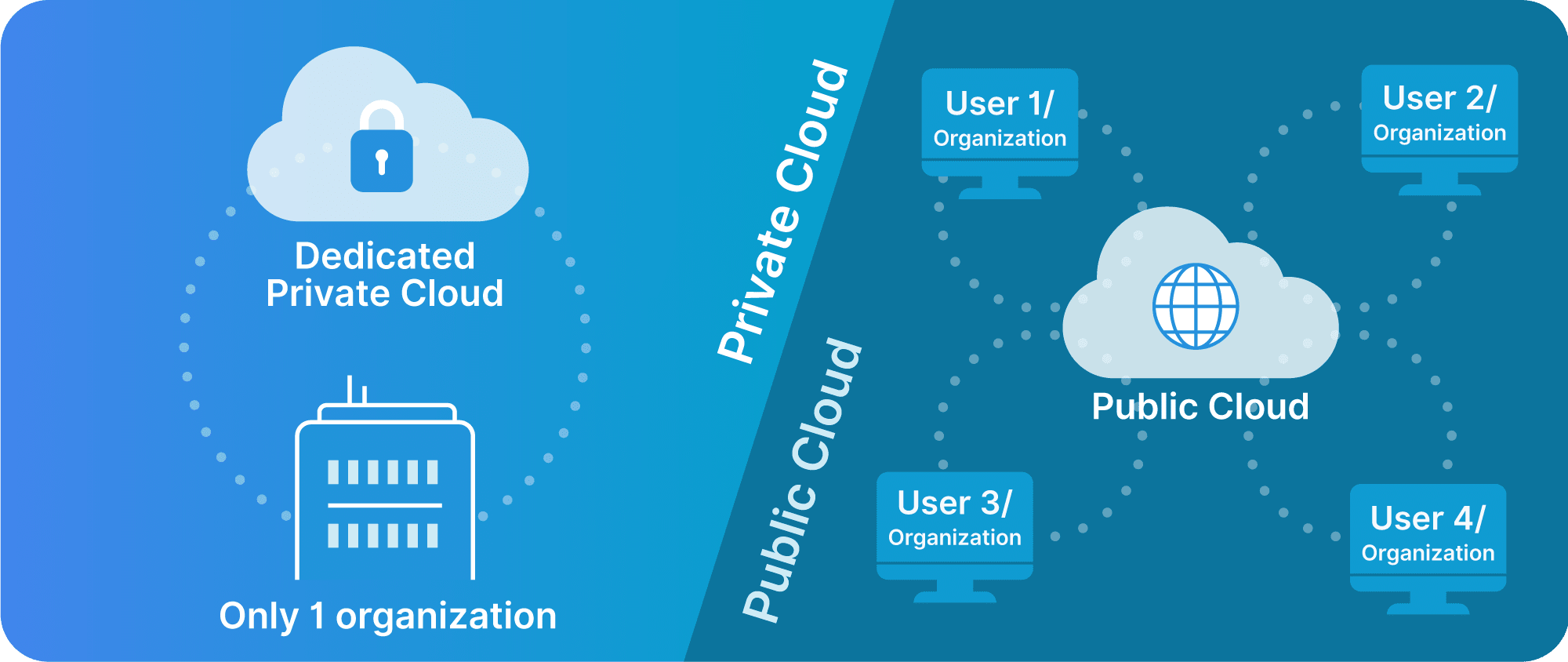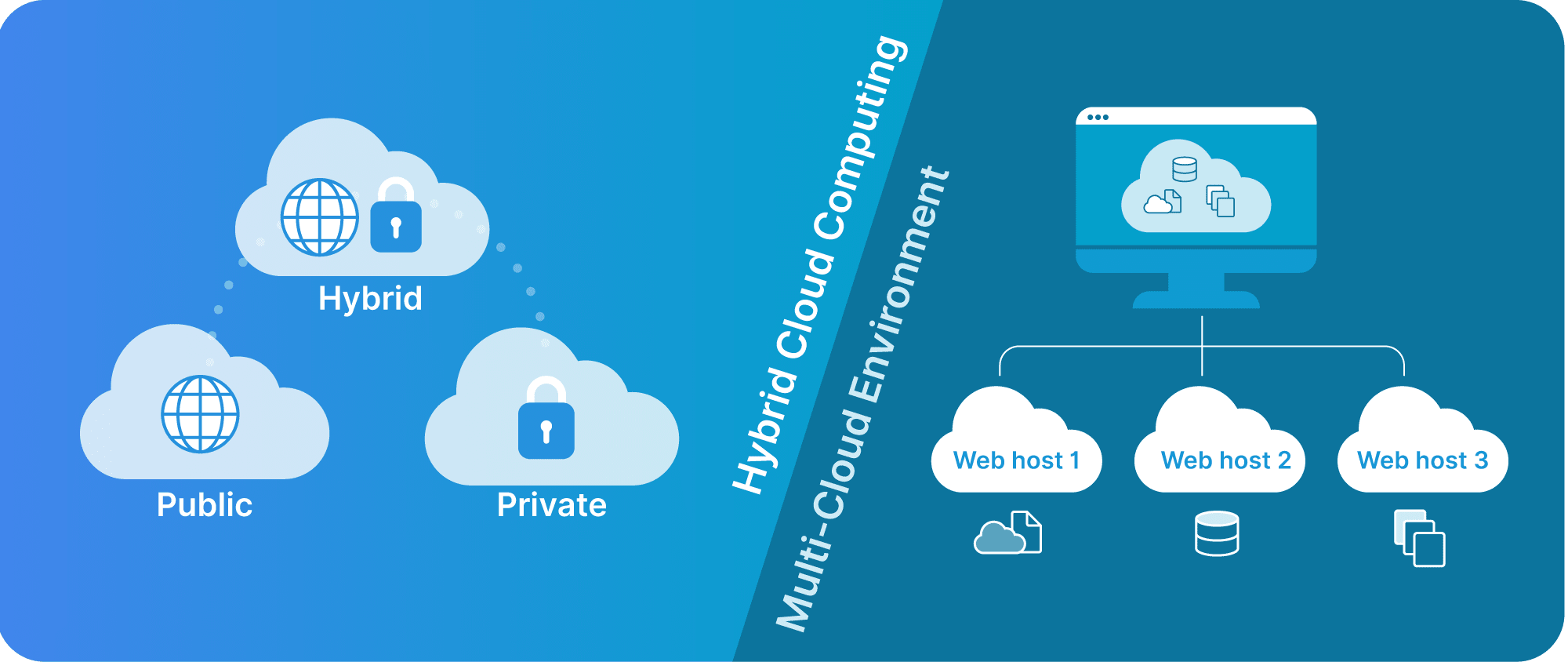Demystifying cloud security: What you need to know
Cloud computing has become an essential part of the modern business landscape. It offers a number of advantages, including scalability, flexibility, and cost-efficiency. However, as organizations move their data and applications to the cloud, data breaches and cyber threats have become increasingly prevalent.
That’s why understanding and implementing effective cloud security measures is no longer optional – it's crucial!
Cloud security is a complex topic, but it is essential to understand the risks associated with cloud computing and take the necessary precautions. With this in mind, this exhaustive guide will uncover the prominence of cloud security, delve into its challenges, and explore the different types of cloud environments and their security implications.
Whether you're an IT professional, a business decision-maker, or simply interested in cloud security, this guide aims to equip you with the knowledge and resources you need to secure your cloud environment effectively!
Understanding the importance of cloud security
Imagine a vast virtual space where you can store your files, access applications, and even power complex processes without the limitations of your local device – this is cloud computing.
At its heart, cloud computing delivers various services over the Internet, from storing data to running apps. It's a paradigm shift empowering individuals and businesses alike to transcend the limitations of traditional computing, offering unparalleled convenience and efficiency.
However, as our reliance on the cloud grows, so does the importance of safeguarding sensitive data and critical systems from potential cyber threats. A staggering 80% of US companies report that their systems have been compromised. This underscores the urgent need for robust cybersecurity measures.
Cloud security involves a series of measures designed to protect data, applications, and infrastructure within the cloud environment. It offers a multitude of benefits that extend beyond just protection against external threats, including:
- Data loss prevention — Data loss can have devastating consequences, both financially and reputationally. Robust cloud security measures help prevent unauthorized access to sensitive information and mitigate the risk of data loss, whether from malicious attacks or simple human error.
- Regulatory compliance — Cloud security aids in ensuring compliance with the stringent data protection regulations of various industries and avoiding hefty penalties and legal issues.
- Business continuity — Implementing security measures, such as data backups and disaster recovery plans, helps businesses ensure the continuity of their operations, even in the face of a disaster or system failure.
- Multi-tenancy security — Cloud environments often host multiple tenants. Robust security protocols are necessary to prevent data leakage between tenants and uphold individual privacy.
- Vulnerability management — Regular security assessments and updates are vital to identify and mitigate potential vulnerabilities within the cloud infrastructure and applications.
As cyber threats evolve, cloud security becomes more than just safeguarding a business's data; it's about ensuring operational continuity and maintaining customer trust.
Challenges and risks in cloud security
Unfortunately, navigating the realm of cloud security isn't without its difficulties that demand meticulous attention.
Mitigating data breaches
One of the most significant concerns in cloud security is the potential for data breaches. As organizations entrust their sensitive information to third-party cloud providers, the risk of unauthorized access becomes ever more pronounced.
High-profile breaches in recent years have accentuated the magnitude of this challenge, demonstrating that even major players in the industry are not impervious. In fact, the sheer volume of data stored in the cloud and the diverse entry points for potential attackers amplify the difficulty of safeguarding information and increase the attack surface. Moreover, the average cost per data breach has been reported to be as high as $4.35 million.
Organizations must employ robust encryption methods and access controls to mitigate this risk. A proactive approach, coupled with regular data security assessments, is imperative to stay one step ahead of cybercriminals.
Understanding the role of shared responsibility
Cloud security operates under a shared responsibility model, wherein both the cloud provider and the user bear specific security responsibilities. This collaborative arrangement, while fostering efficiency, can also blur the lines of accountability.
Under this model, the cloud service provider is responsible for the security of the cloud. This includes securing the underlying infrastructure that supports cloud services, such as hardware, software, networks, and facilities.
On the other hand, the user is responsible for security in the cloud. This involves protecting the data stored in the cloud, managing access to this data, securing applications, and implementing client-side data encryption.
Failing to understand and fulfill these responsibilities can leave chinks in the armor of an otherwise well-protected system. Ambiguity in roles can lead to:
- Security gaps and overlooked vulnerabilities.
- Patch and update management negligence.
- Inadequate controls that risk unauthorized access.
- Data breaches resulting from misconfigured settings.
Navigating compliance and legal aspects
With data often traversing national borders, the dynamic nature of cloud environments can complicate compliance efforts. Different industries are subject to various compliance standards, such as the General Data Protection Regulation (GDPR), the California Consumer Privacy Act (CCPA), and the Health Insurance Portability and Accountability Act (HIPAA).
These regulations are designed to uphold privacy, prevent data breaches, and ensure data integrity, making them a vital aspect of any cloud security strategy.
Non-compliance can have severe legal implications, such as hefty fines, lawsuits, and significant reputational damage. For instance, under GDPR, companies can be fined up to 4% of their annual global turnover or €20 million (whichever is higher) for serious infringements.
On the bright side, these challenges are not insurmountable. There are a variety of solutions available to mitigate these risks, like the use of:
- Firewalls.
- Encryption methods.
- Multi-factor authentication and efficient access controls.
- Regular security audits.
- Penetration testing.
- Staff training.
It's also vital to stay updated with regulation changes and adjust security practices accordingly.
However, since managing all these security aspects can be an intricate endeavor, particularly for businesses without a dedicated IT security team, outsourcing to a trusted provider, like Liquid Web, can be beneficial. Organizations must meticulously choose cloud providers that offer transparent cloud data handling practices and robust security measures that align with regulatory requirements.
Different types of cloud environments and their security implications
The cloud environment that a business chooses can significantly impact its security considerations. This decision hinges on the understanding of four main cloud models: public, private, hybrid, and multi-cloud environments.


Public clouds
Public clouds are like the bustling city squares of the digital realm. They are shared platforms provided by third-party service providers, such as Amazon Web Services (AWS), Microsoft Azure, and Google Cloud Platform (GCP). Their cost-effectiveness and easy scalability draw organizations of all sizes to public clouds.
Yet their openness poses security concerns. The multi-tenancy nature of public clouds means data from different clients is stored on shared resources, posing a risk of cross-access and potential data breaches.
Additionally, businesses largely rely on the cloud provider's security protocols, which can vary in strength and comprehensiveness. Adequate measures, such as encryption and strong access controls, become crucial to maintain the integrity and confidentiality of sensitive information.
| Pros | Cons |
|---|---|
| Cost-effective and scalable. | Shared resources increase security risks. |
| Accessible from anywhere. | Limited control over infrastructure. |
| No maintenance burden. | Potential for vendor lock-in. |
| Wide range of services available. | Data sovereignty concerns. |
Private clouds
Private clouds are the exclusive gated communities of the cloud landscape. They are dedicated environments used by a single organization, providing greater control over resources and data. That’s why industries with stringent compliance requirements, like finance and healthcare, often prefer private clouds.
While this setup provides more control over data and processes, it still requires vigilant monitoring and management to prevent insider threats and ensure regulatory compliance. A skilled in-house security team might be essential since the responsibility of securing the infrastructure lies with the organization. Also, the risk of outgrowing the private infrastructure might lead to compromised security.
| Pros | Cons |
|---|---|
| Enhanced security and control. | Higher initial setup and maintenance costs. |
| Compliance with stringent regulations. | Limited scalability compared to public clouds. |
| Isolated environment for sensitive data. | Resource underutilization. |
| Reduced risk of shared vulnerabilities. | Internal expertise is required for management. |
Hybrid clouds
Hybrid clouds combine elements of both public and private clouds. This approach allows organizations to leverage the advantages of both environments, tailoring their setup to specific needs.
For instance, sensitive data can be stored in the private segment, while non-sensitive operations can take advantage of the public segment's scalability.
While this model offers flexibility, it also brings about its own set of security challenges. The complexity of integrating public and private environments can create security inconsistencies, and the movement of data between these environments can expose it to vulnerabilities.
| Pros | Cons |
|---|---|
| Flexibility to balance public and private cloud models. | Complex architecture to manage. |
| Scalability combined with control. | Potential for security policy mismatches. |
| Reduced risk of vendor lock-in. | Integration challenges between the public and private clouds. |
| Cost optimization based on use cases. | Requires specialized expertise. |
Multi-cloud environments
The multi-cloud environment involves using services from multiple public cloud vendors or combining public and private clouds.
This strategy reduces dependency on a single provider, prevents vendor lock-in, and offers redundancy, but it also amplifies security challenges. Different providers have varied security protocols. Coordinating security protocols, compliance requirements, and data transfers between disparate clouds demands meticulous planning to ensure consistent protection.
| Pros | Cons |
|---|---|
| Hosting provider diversity prevents vendor lock-in. | Complex management across multiple vendors. |
| Enhanced redundancy and resilience. | Integration and compatibility challenges. |
| Optimized pricing and service selection. | Increased risk of inconsistent security. |
| Tailored solutions for specific needs. | Potential for increased management costs. |
Ultimately, deciding which cloud model to employ depends on the organization’s goals and requirements.
Regardless of the chosen cloud environment, Liquid Web can assist businesses in their journey toward full-bodied cloud security. Liquid Web's customizable dedicated infrastructure offers a viable solution, especially for large enterprises with unique hosting needs.
Building a robust cloud security strategy with Liquid Web
Building a robust cloud security strategy is a multifaceted task that involves several key elements. Implementing strong access controls, regularly patching and updating systems, encrypting data, and monitoring for suspicious activity are all binding steps in creating a secure cloud environment.
Cloud security tools and solutions play a significant role in implementing this strategy. They provide proactive protection, detect threats, and respond automatically to potential attacks, ensuring data privacy, integrity, and availability in the cloud.
This is where Liquid Web, a leader in managed hosting and cloud services, steps in to provide comprehensive cloud security solutions that combine cutting-edge technology with expert guidance. This includes:
- Advanced threat detection — Liquid Web employs cutting-edge threat detection tools to monitor cloud environments continuously and take swift action to neutralize threats.
- Multi-layered defense — A strong security setup requires multiple layers of defense. Liquid Web implements firewalls, intrusion detection systems, and encryption mechanisms to ensure your data remains inaccessible to unauthorized entities.
- Regular security audits — Security is an ongoing process. By conducting regular security audits and vulnerability assessments, Liquid Web can identify weak points in your infrastructure and prevent breaches before they happen.
- Disaster recovery planning — Liquid Web helps you develop a comprehensive disaster recovery plan, ensuring business continuity even in the face of adversity.
- 24/7/365 support— Cyber threats don't adhere to a schedule. Liquid Web's experts work around the clock, monitoring and responding to security incidents in real time.
One example of a business that has successfully implemented a tenacious cloud security strategy with Liquid Web is Crazy Engineers. Kaustubh Katdare, the founder of Crazy Engineers, praised Liquid Web’s tailored solutions and exceptional support.
Crazy Engineers’ global community faced significant uptime and security challenges, including a major hack. Liquid Web stepped in to provide reliable hosting, boosting the site's resilience to handle a 70% traffic increase and enhancing database speeds by 330%.
It’s clear that Liquid Web's secure, fast, and reliable hosting can play a crucial role in helping businesses execute their cloud security strategies effectively. With a 99.999% uptime guarantee and fast loading times, Liquid Web ensures a smooth online experience for customers while providing the hardy security businesses need.
With Liquid Web, businesses can confidently tackle the complexities of cloud security, knowing they have a trusted partner by their side.
Take the next step in cloud security with Liquid Web
Navigating the complexities of cloud security can seem overwhelming, but it's an essential task in today's digital landscape. From understanding the different types of cloud environments and their security implications to managing the shared responsibility model and legal compliance, businesses must take a proactive approach to protect their data, applications, and infrastructure.
Building a robust cloud security strategy is a critical step in this journey. Implementing strong access controls, regularly updating systems, encrypting data, and monitoring for suspicious activity can significantly enhance a business's security posture. Cloud security tools and solutions, like those offered by Liquid Web, are necessary.
Liquid Web's services are designed to cater to the unique needs of businesses, offering solutions like fully managed hosting, private cloud hosting, high availability hosting, compliant solutions, and customizable dedicated infrastructure. With 24/7 human support and hassle-free migrations, Liquid Web provides businesses with the assurance they need to focus on their core operations, knowing their cloud security is in safe hands.
Related Resources

Luke Cavanagh
Product Operations Manager at Liquid Web. Devoted husband and Tween wrangler. Synthwave enthusiast. Jerry Goldsmith fan. Doctor Who fan and related gubbins.
Keep up to date with the latest Hosting news.



